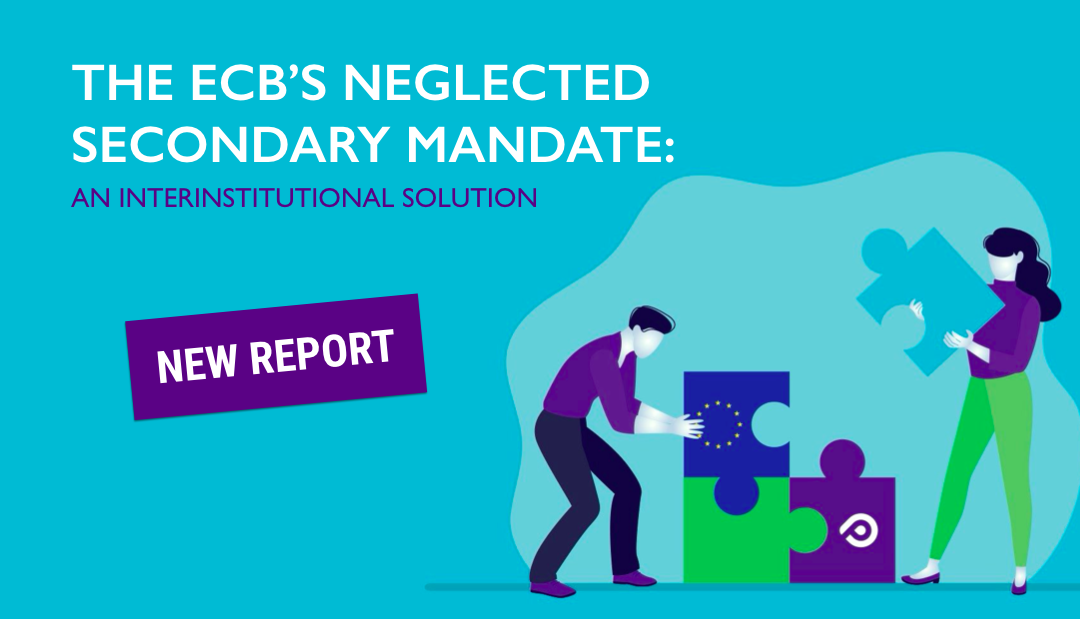A new report by Positive Money Europe proposes to break the deadlock on the ECB’s secondary mandate. Rather than cherry-picking its secondary objectives, the ECB should coordinate with other EU institutions to seek clarity on which EU priorities the ECB should support.
Key points from the report, written by Dr. Nik de Boer and Dr. Jens van ‘t Klooster are:
 The secondary mandate is as legally binding as the ECB’s primary mandate of price stability. While the ECB cannot privilege the achievement of its secondary mandate over its primary mandate, it shall always pursue it if it doesn’t conflict with what the primary mandate requires. ECB Board Member Frank Elderson recently explained ‘the ECB’s “secondary objective”, stipulates a duty, not an option’. At a very minimum, the ECB should explain to the public and to the Parliament how it considers the secondary mandate when it decides on monetary policy.
The secondary mandate is as legally binding as the ECB’s primary mandate of price stability. While the ECB cannot privilege the achievement of its secondary mandate over its primary mandate, it shall always pursue it if it doesn’t conflict with what the primary mandate requires. ECB Board Member Frank Elderson recently explained ‘the ECB’s “secondary objective”, stipulates a duty, not an option’. At a very minimum, the ECB should explain to the public and to the Parliament how it considers the secondary mandate when it decides on monetary policy.
However, the ECB has so far neglected its secondary mandate. The lead legal counsels of the ECB acknowledge this in a recent report that states that the ECB “has not to date relied on the secondary objective as an explicit legal basis for its monetary policy”. The report by De Boer and Van ‘t Klooster also shows that the ECB has only mentioned the secondary objectives in 10 speeches between 1998 and 2019. Hence, beyond the legal obligation to act on it, it has largely failed to explain how it considers the secondary mandate in its monetary policy-making. The report suggests that this is probably illegal.
Taking the obligations around the secondary mandate seriously requires high-level coordination with political institutions in the EU. Rather than cherry-picking its secondary objectives, the ECB should coordinate with the Parliament and the Council of the EU to specify the secondary mandate. The report outlines three avenues for doing so. This would be compatible with central bank independence and provide democratic guidance that is necessary to fulfill the obligations that the secondary mandate imposes.
Explicitly referring to the secondary mandate would increase the ECB’s legitimacy and ability to act on societal challenges. An explanation of how the ECB considers the varying secondary objectives would make the ECB’s monetary policy more understandable. Drawing on the secondary mandate that has been specified due to coordination with political institutions in the EU would also remove legal and political barriers for the ECB to more forcefully act on, for example, inequality or climate change, in line with the EU’s objectives.
Going forward, Positive Money Europe intends to work together with Members of the European Parliament to push forward the recommendations in the context of the Parliament’s annual resolution on the ECB, led this year by Greek MEP Dimitrios Papadimoulis, as well as the negotiations with the ECB on a new inter-institutional framework on accountability, an initiative led by the Socialist & Democrats group. (1)
To reference this report, please use the following suggested citation:
De Boer, N. and van ‘t Klooster, J. (2021) ‘The ECB’s Neglected Secondary Mandate: An Inter-Institutional Solution’. Positive Money Europe. http://www.positivemoney.eu/wp-content/uploads/2021/10/The-ECBs-neglected-secondary-mandate_v6.0.pdf


